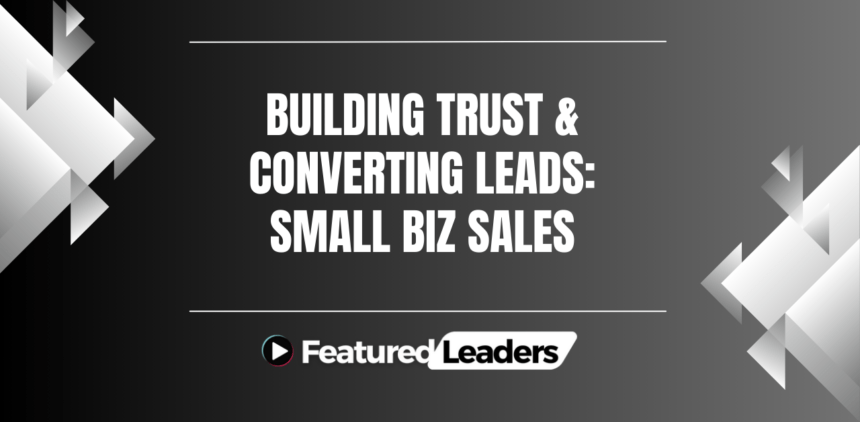Welcome to our article on building trust and converting leads for small businesses. In today’s competitive market, trust is the key factor that can make or break a sale. As a small business owner, gaining the trust of your potential customers is crucial for driving sales growth and establishing long-term relationships.
According to a LinkedIn State of Sales Guide, 51% of decision-makers rank trust as the top factor they desire in a salesperson. This highlights the importance of building trust in the sales process.
In this article, we will dive into effective sales techniques that can help small businesses build trust and convert leads into loyal customers. From understanding the psychology of trust to leveraging personalization and follow-up strategies, we will explore actionable steps to boost your sales efforts.

Key Takeaways:
- Trust is the top factor desired by decision-makers.
- Gaining trust is crucial for driving sales growth.
- Personalization and timely follow-up are key sales techniques.
- Email marketing is an effective tool for lead conversion.
- Understanding the psychology of trust can enhance your sales efforts.
The Importance of Trust in Sales
Trust is a crucial factor in the sales process. According to Harvard Business School professor Gerald Zaltman, 95% of purchase decisions are made based on emotion. Small businesses need to understand their customers’ goals, habits, fears, and concerns in order to build trust. By developing a personalized approach and having meaningful conversations with prospects, sales teams can establish trust and increase their chances of converting leads into customers.
Leveraging Email Marketing for Lead Conversion
Email marketing is a powerful tool that can significantly contribute to lead conversion. By leveraging this strategy, businesses can effectively connect with prospects and propel the sales conversation forward. In fact, according to a Campaign Monitor report, email marketing boasted an average Return on Investment (ROI) of a whopping 4400% in 2018.
One of the key advantages of email marketing is its ability to nurture leads. By providing valuable and engaging content through well-crafted emails, businesses can build trust and establish a strong rapport with their prospects. A carefully designed email campaign can help address their pain points, offer relevant solutions, and showcase the unique value proposition of the products or services being offered.
Moreover, email marketing allows for personalized communication, catering specifically to the individual needs and preferences of each lead. By segmenting leads based on demographics, interests, and previous interactions, businesses can tailor their email content to resonate with each recipient on a more personal level. This personalized approach creates a sense of relevance and fosters a deeper connection with prospects, ultimately increasing the likelihood of lead conversion.
Take a look at the image below to see how successful email marketing campaigns can drive lead conversion and boost sales growth:
Email Marketing Best Practices for Lead Conversion
1. Craft Compelling Subject Lines: Grab the attention of recipients by creating subject lines that are engaging and intriguing. A compelling subject line greatly increases the chances of your emails being opened and read.
2. Provide Value: Deliver informative and valuable content that addresses the pain points and challenges faced by your leads. Position yourself as a trusted expert and resource in your industry.
3. Call-to-Action: Include clear and persuasive calls-to-action (CTAs) in your emails to guide leads towards the next step in the sales process. Make it easy for them to take action by providing clear instructions and prominent buttons or links.
4. Optimize for Mobile: With the majority of emails being opened on mobile devices, it’s crucial to ensure that your emails are mobile-friendly. Optimize your layout, fonts, and images to provide a seamless reading experience on smartphones and tablets.
“Email marketing allows businesses to build trust, nurture leads, and drive conversion through personalized communication and valuable content.” – Jane Smith, Digital Marketing Expert
In conclusion, email marketing is a powerful tool for lead conversion. By leveraging the right strategies and best practices, businesses can establish a strong connection with their prospects, build trust, and ultimately increase their chances of converting leads into loyal customers.
The Power of Timely Follow-Up
Timely follow-up is crucial for successful lead conversion. Research shows that the odds of a successful sales connect call decrease more than 6x after the first hour. Consistent and timely follow-up ensures that prospects feel valued and increases the chances of converting them into customers.
Sales teams should have a systematic approach to follow-up and prioritize prompt communication with leads.
“The key to effective follow-up is speed and consistency. When you show prospects that you value their time and are committed to helping them, they are more likely to trust your brand and consider your solutions.”
The Importance of a Sales Connect Call
A sales connect call is an essential component of the follow-up process. It provides an opportunity to establish a personal connection with prospects, understand their needs, and address any concerns they may have.
By conducting sales connect calls in a timely manner, businesses can demonstrate their responsiveness, build trust, and move the sales conversation forward.
Creating a Systematic Follow-Up Approach
A systematic approach to follow-up ensures consistency and maximizes the chances of lead conversion. Here is an example of a follow-up framework:
| Day | Activity |
|---|---|
| Day 1 | Send a personalized thank-you email within 24 hours of initial contact. |
| Day 3 | Make a follow-up call to touch base and address any questions or concerns. |
| Day 7 | Send a follow-up email with additional information and resources. |
| Day 14 | Reach out again to schedule a follow-up meeting or demo. |
Remember, each follow-up interaction should provide value to the prospect and be tailored to their specific needs and interests.
Personalized Offers for Increased Conversion
Offering personalized incentives and discounts can significantly impact sales conversion. In today’s competitive market, businesses need to go beyond generic promotions and discounts to engage their prospects and foster trust. By tailoring offers to individual customers, businesses can create a unique and personalized experience that resonates with their target audience.
Salespeople should have the flexibility to create customized offers based on the needs and preferences of their prospects. This requires a deep understanding of the customer’s pain points, desires, and motivations. By gathering data and utilizing customer relationship management (CRM) tools, sales teams can segment their audience and create targeted offers for different customer segments.
Examples of personalized offers include:
- Discounted products/services: Providing discounts on specific products or services that align with the customer’s interests or previous purchases.
- Free shipping: Offering free shipping as a reward for customer loyalty or for reaching a certain spending threshold.
- Buy more get more promotions: Providing incentives for customers to purchase more items by offering discounts or free products.
- Repeat customer discounts: Recognizing and rewarding customer loyalty by offering exclusive discounts or promotions to repeat customers.
By tailoring offers in this way, businesses can show their customers that they are valued and understand their unique needs. This personalized approach helps build trust, increases customer satisfaction, and ultimately boosts sales conversion.

Example of Personalized Offers:
| Customer Segment | Offer |
|---|---|
| New Customers | 10% off their first purchase |
| Frequent Shoppers | Free shipping on all orders |
| Loyal Customers | 20% off for every fifth purchase |
| High-Value Customers | Exclusive access to limited-edition products |
By offering personalized incentives and discounts, businesses can increase customer engagement, foster trust, and ultimately improve their sales conversion rates. It’s important for sales teams to continuously analyze customer data and refine their offers to ensure they are relevant and compelling to their target audience.
The Role of Lead Generation in Building Trust
Lead generation plays a critical role in the process of building trust and driving sales growth for small businesses. By attracting potential customers who are genuinely interested in the products or services offered, businesses can establish a solid foundation for building trust.
Effective lead generation strategies pave the way for meaningful interactions with prospective customers, enabling businesses to showcase their value proposition and establish themselves as trustworthy sources. Let’s explore some powerful lead generation strategies that can help small businesses build trust and convert leads into loyal customers.
Cold Emailing: Reaching Out to the Right Audience
Cold emailing is an effective lead generation technique that allows businesses to directly connect with their target audience. By crafting personalized, compelling emails, businesses can capture the attention of potential customers and initiate valuable conversations.
When cold emailing, it is important to tailor the message to the recipient’s needs, addressing their pain points and offering solutions. This personalized approach shows that you understand their challenges and are genuinely interested in helping them. Building trust through effective communication is vital for converting leads into customers.
Creating Newsletters: Establishing Expertise and Credibility
Newsletters are a powerful tool for lead generation and building trust. By consistently delivering valuable content to subscribers’ inboxes, businesses can position themselves as industry experts and establish credibility.
Quality newsletters provide insights, tips, and relevant information that engage subscribers and address their pain points. By consistently delivering value, businesses can nurture leads over time and establish trust with their target audience.
Optimizing Search Engine Visibility: Building Trust through Authority
Optimizing search engine visibility is crucial for generating high-quality leads and building trust. When businesses appear prominently in search engine results for relevant keywords, it instills confidence in potential customers and positions the brand as a reliable authority in the industry.
Investing in search engine optimization (SEO) techniques, such as optimizing website content, targeting relevant keywords, and building backlinks, helps businesses build trust by ensuring their online presence is visible and easily accessible to their target audience.
| Lead Generation Strategies | Benefits |
|---|---|
| Cold Emailing | Directly connect with the target audience |
| Creating Newsletters | Establish expertise and credibility |
| Optimizing Search Engine Visibility | Build trust through authority |
Implementing these lead generation strategies not only helps small businesses generate high-quality leads but also lays the foundation for building trust. By providing personalized and valuable interactions, businesses can nurture leads and cultivate long-term relationships with their customers.

The Psychology of Trust in Sales
The psychology of trust plays a significant role in sales. Customers are more likely to trust brands that offer unique value propositions and demonstrate consistency and reliability. Social proof, in the form of customer reviews and testimonials, is a powerful trust-building tool. Additionally, providing accurate and relevant information while avoiding information overload can help establish trust with sales leads. Understanding the psychology of trust can enable businesses to create a reliable brand image that inspires confidence in their products or services.
When it comes to building trust with sales leads, businesses can leverage psychological insights to create a positive impression. By understanding the cognitive and emotional factors that influence trust, small businesses can develop effective strategies to gain the confidence of potential customers.
The Impact of Unique Value Propositions and Consistency
One key aspect of the psychology of trust is the importance of unique value propositions and consistency. Customers are more likely to trust brands that offer something different and valuable. By clearly defining the unique benefits of their products or services, businesses can attract the attention of sales leads and distinguish themselves from competitors.
Consistency also plays a vital role in building trust. When customers experience consistent quality, reliable customer service, and timely communication from a brand, they feel more confident in their decision to engage with that brand. This consistency creates a reliable brand image, fostering trust and loyalty among sales leads.
The Power of Social Proof
Another critical element of the psychology of trust is social proof. Customer reviews and testimonials serve as tangible evidence of a brand’s trustworthiness. When sales leads see positive feedback from satisfied customers, it helps alleviate any concerns or doubts they may have. Including customer reviews and testimonials on websites, social media platforms, and marketing materials can significantly impact trust levels and influence sales conversion.
Providing Accurate and Relevant Information
Building trust with sales leads also requires providing accurate and relevant information. Overloading leads with excessive information can be overwhelming and may lead to mistrust. Instead, businesses should focus on delivering concise and clear messages that address the specific needs and concerns of potential customers.
To establish trust, businesses should provide transparent information about their products or services. This includes clearly stating pricing, terms, and any limitations or conditions. By being upfront and honest, businesses can instill confidence in sales leads and build a solid foundation of trust.
Trust-Building Strategies
| Trust-Building Strategy | Description |
|---|---|
| Unique Value Propositions | Clearly define the unique benefits of products or services to attract and engage sales leads. |
| Consistency | Deliver consistent quality, reliable customer service, and timely communication to build trust and loyalty. |
| Social Proof | Showcase positive customer reviews and testimonials as evidence of the brand’s trustworthiness. |
| Accurate and Relevant Information | Provide transparent and concise information about products or services to establish trust. |
By implementing these trust-building strategies, businesses can effectively connect with sales leads, establish strong relationships, and increase their chances of converting leads into loyal customers.
The Impact of Industry Image on Trust
The trust customers place in businesses is greatly influenced by the overall image of the industry they operate in. Some industries, such as doctors and scientists, tend to enjoy higher levels of trust compared to others, like politicians and advertising executives. This means that businesses operating in industries with negative trust expectations face additional challenges in building trust with their customers.
To effectively build trust, it is crucial for businesses to understand the specific trust dynamics within their industry. By recognizing the perception and expectations associated with their industry, businesses can tailor their trust-building strategies accordingly and address any potential skepticism or concerns that customers may have.
Creating a positive image in an industry with low trust requires consistent and transparent communication, ethical business practices, and a focus on delivering exceptional value and customer satisfaction. By going above and beyond expectations and showcasing their expertise and integrity, businesses can gradually earn the trust of their audience and differentiate themselves from competitors.
FAQ
Why is building trust important in sales?
Building trust is important in sales because it is the top factor desired by decision makers, according to a LinkedIn State of Sales Guide. Trust helps establish credibility and strengthens relationships with customers, increasing the chances of converting leads into customers.
How can small businesses leverage email marketing for lead conversion?
Small businesses can leverage email marketing for lead conversion by sending informative and engaging emails that provide value to prospects. By staying connected and nurturing leads through email, businesses can move the sales conversation forward and increase the chances of conversion. Email marketing had an average ROI of 4400% in 2018, according to a Campaign Monitor report.
Why is timely follow-up crucial for lead conversion?
Timely follow-up is crucial for lead conversion because research shows that the odds of a successful sales connect call decrease significantly after the first hour. Consistent and prompt follow-up shows prospects that they are valued and increases the chances of converting them into customers. Sales teams should have a systematic approach to follow-up and prioritize communication with leads.
How can personalized offers impact sales conversion?
Personalized offers can significantly impact sales conversion by tailoring incentives and discounts based on the needs and preferences of prospects. By creating customized offers, such as discounted products/services, free shipping, or buy more get more promotions, businesses can foster trust and increase their chances of conversion. Personalized offers make customers feel valued and show that the business understands their individual needs.
How does lead generation contribute to building trust?
Lead generation is crucial for building trust because it allows businesses to attract potential customers who are interested in their products or services. By implementing effective lead generation strategies, such as cold emailing, creating newsletters, and optimizing search engine visibility, small businesses can generate high-quality leads and establish a foundation for building trust with their target audience.
What is the role of psychology in building trust in sales?
Understanding the psychology of trust is important in sales as it plays a significant role in building trust with sales leads. Customers are more likely to trust brands that offer unique value propositions, demonstrate consistency and reliability, and provide accurate and relevant information. By understanding the psychology of trust, businesses can create a reliable brand image that inspires confidence in their products or services.
How does industry image impact trust in businesses?
Industry image can impact the trust customers place in businesses. Some industries, such as doctors and scientists, tend to be trusted more than others, like politicians and advertising executives. Businesses operating in industries with negative trust expectations may face additional challenges in building trust with customers. It is important for businesses to understand the specific trust dynamics within their industry and tailor their trust-building strategies accordingly.






